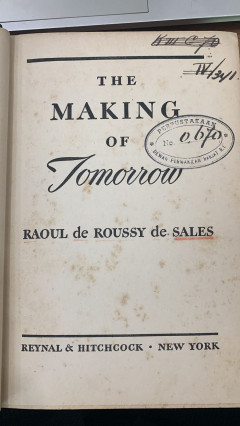Ditapis dengan

The Making of Tomorrow
This book discusses political forces during World War II. The book consists of 12 chapters divided in six parts about modern imperative of nationalism, diversity of national concepts, nationalism as a force of destruction, collectivism and total war, the conflicts between capitalism and democracy and between socialism and democracy, reasons to opposition to war and the guilt-complex, democracy …
- Edisi
- 1
- ISBN/ISSN
- -
- Deskripsi Fisik
- 17cm; 340hlm; index
- Judul Seri
- -
- No. Panggil
- 320.4 RAO m
More Than the Law: Behavioral and social facts in legal decision making
this book provides a fascinating and accessible introduction for students and other readers to the ways in which behavioral and social knowledge can and should inform legal decisions, as well ad ways in which such knowledge can be misused. Eleven different stories are presented, highlighting major legal decisions such as mandatory testing for drug use in schools, abortion, use of the death pena…
- Edisi
- 2
- ISBN/ISSN
- 978-1-59147-255-1
- Deskripsi Fisik
- Xi, 271 hal. : 23 cm.
- Judul Seri
- -
- No. Panggil
- 349.73 01 9 ENG m
 Karya Umum
Karya Umum  Filsafat
Filsafat  Agama
Agama  Ilmu-ilmu Sosial
Ilmu-ilmu Sosial  Bahasa
Bahasa  Ilmu-ilmu Murni
Ilmu-ilmu Murni  Ilmu-ilmu Terapan
Ilmu-ilmu Terapan  Kesenian, Hiburan, dan Olahraga
Kesenian, Hiburan, dan Olahraga  Kesusastraan
Kesusastraan  Geografi dan Sejarah
Geografi dan Sejarah